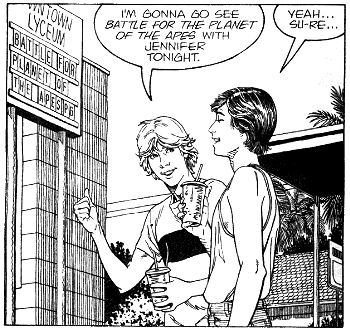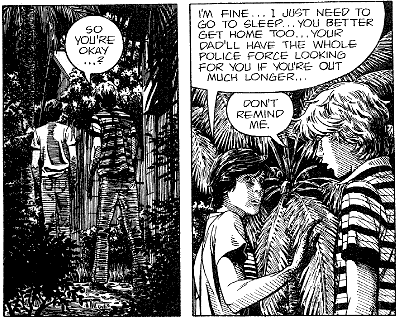
by Ed Brubaker and Eric Shanower
32-page graphic short-story
Rating:
![]() This is the sort of story that one hopes isn't autobiographical (or even just biographical). It's not so horrible as to be impossible, but it's discomforting enough that you really hope it's just fiction. It's not billed as autobiography. Nonetheless, reading the detailed description and rather believable characterisation, and looking at the equally detailed and painstakingly authentic art, you can't help wondering... at least a little.
This is the sort of story that one hopes isn't autobiographical (or even just biographical). It's not so horrible as to be impossible, but it's discomforting enough that you really hope it's just fiction. It's not billed as autobiography. Nonetheless, reading the detailed description and rather believable characterisation, and looking at the equally detailed and painstakingly authentic art, you can't help wondering... at least a little.

![]() The realism and convincing authenticity are aided considerably by the fact that both Shanower and Brubaker each spent a part of their youths (not at the same time) at Guantanamo Bay, the U.S. naval base on the island of Cuba where the story takes place. Despite the fact that the story's two main characters are "military brat" teenagers living at "Gitmo" back when Brubaker or Shanower would have been about that age, Brubaker maintains that this Eisner-nominated story is (almost) entirely fictional. {whew}
The realism and convincing authenticity are aided considerably by the fact that both Shanower and Brubaker each spent a part of their youths (not at the same time) at Guantanamo Bay, the U.S. naval base on the island of Cuba where the story takes place. Despite the fact that the story's two main characters are "military brat" teenagers living at "Gitmo" back when Brubaker or Shanower would have been about that age, Brubaker maintains that this Eisner-nominated story is (almost) entirely fictional. {whew}
![]() Because of its geopolitical location, Guantanamo Bay is almost entirely isolated from the rest of the world. This factors heavily into the story, both in the atmosphere it sets, and the consequences of what happens. But Brubaker also hints at the idea of Gitmo as an example of 1970's America in miniature.
Because of its geopolitical location, Guantanamo Bay is almost entirely isolated from the rest of the world. This factors heavily into the story, both in the atmosphere it sets, and the consequences of what happens. But Brubaker also hints at the idea of Gitmo as an example of 1970's America in miniature.
![]() I've praised Shanower's art in my review of Prez: Smells Like Teen President (also written by Brubaker), but I'll repeat myself here. The characters all look exactly the age they're supposed to be, wearing exactly the right clothes someone their age would have worn that year. (I know: this was my generation.) It's especially effective on the characters of Frank and Charlie, who look like adolescent boys (not just short adult men). And on the first and last pages, set 12 years later, Charlie looks like: Charlie, 12 years older. The character's body language and facial expressions speak volumes, saving Brubaker from lots of unnecessary exposition.
I've praised Shanower's art in my review of Prez: Smells Like Teen President (also written by Brubaker), but I'll repeat myself here. The characters all look exactly the age they're supposed to be, wearing exactly the right clothes someone their age would have worn that year. (I know: this was my generation.) It's especially effective on the characters of Frank and Charlie, who look like adolescent boys (not just short adult men). And on the first and last pages, set 12 years later, Charlie looks like: Charlie, 12 years older. The character's body language and facial expressions speak volumes, saving Brubaker from lots of unnecessary exposition.

![]() This means that Brubaker is free to use the narrative captions to provide information the art cannot tell, filling in details about general events happening off-panel, or explaining the unique circumstances of life at Gitmo and how they affect what's happening. The dialog rings true, as well.
This means that Brubaker is free to use the narrative captions to provide information the art cannot tell, filling in details about general events happening off-panel, or explaining the unique circumstances of life at Gitmo and how they affect what's happening. The dialog rings true, as well.
![]() But what makes this book particularly compelling is the story itself: the suspense and mystery, the gradual unfolding of events, the response of the community around them, the central characters' reactions, and the pain it all brings about. What ultimately got to me was how - despite having never lived in anything like a military base on Cuba, despite never having dealt with "an accidental death" like this in my life - I could relate to what Charlie was going through... I could see myself in his shoes.
But what makes this book particularly compelling is the story itself: the suspense and mystery, the gradual unfolding of events, the response of the community around them, the central characters' reactions, and the pain it all brings about. What ultimately got to me was how - despite having never lived in anything like a military base on Cuba, despite never having dealt with "an accidental death" like this in my life - I could relate to what Charlie was going through... I could see myself in his shoes.
![]() It's not often that a single stand-alone 32-page comic book can stop me in my tracks and leave me searching for words to express what I'm thinking. This is one such book: a good one.
It's not often that a single stand-alone 32-page comic book can stop me in my tracks and leave me searching for words to express what I'm thinking. This is one such book: a good one.
![]()
© Todd VerBeek, Radio ZeroTM